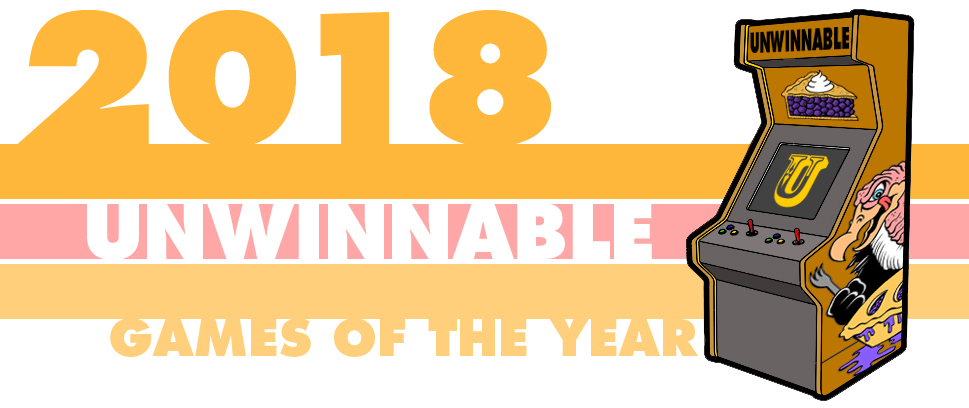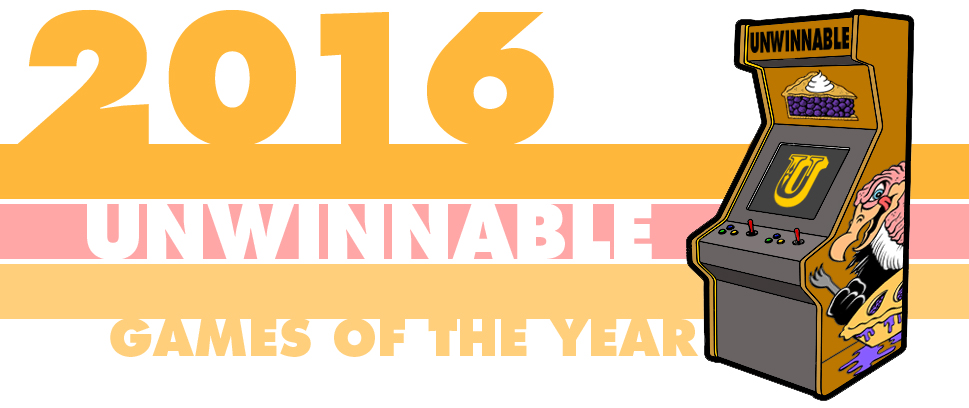
The Best Games of 2018
2018 was a lot. Like, a looooot. It felt like developers tried to overcome 2017’s “best year in gaming this decade” moniker through sheer volume. Quite a few triple-A juggernauts with heavy brand name power dominated the field, confirming that: a) gamers aren’t finished drooling over open worlds; b) an aging developer population has yet to tire of father/son allegories; and c) yes, Nintendo can reskin a 20-year-old game and fans will still trample over each other to catch ‘em all.
Perhaps more amazing is the number of indie games that still managed to seize our attention despite those 30-hour endeavors vying for our time. Titles that perfected or ingeniously combined familiar genres, or else stamped forward in a direction all their own. I personally delighted in seeing so many smaller titles go toe-to-toe against these million-dollar behemoths and, in that vein, the Unwinnable staff has not disappointed me in their best-of choices.
If we’re being honest, though, this year’s most interesting developments in gaming happened off-screen. Developers and others in the industry came forward again and again to detail the rampant sexual harassment, abuse and exploitation so widespread it’s become an industry standard, and games journalism had to put on its big boy pants to report on all the breaking scandals. Going forward, conditions may or may not change, but if 2018’s proven anything it’s that these voices have an audience, even as large portions of the gaming community continue to be polarized.
Oh yeah, and Fornite. That was…a thing.
(Alyse Stanley, Curator)

The Gosh Darn Silliest Game Award: The Haunted Island, a Frog Detective Game
Dancing and games tend to mix really well together. Putting dance in a game doesn’t require reams of dialogue trees, hours of voice acting or elaborately detailed physics interactions. Just a little motion capture and a lot of love. Maybe that’s why so many games released on the original PlayStation relied so heavily on dance: from Parappa the Rapper’s papercut breaks to Vib Ribbon’s loopy strut, dance allowed these games to be vibrantly expressive in spite of their hardware limitations.
The Haunted Island, A Frog Detective Game, descends from this lineage. All the mysteries and dilemmas of the eponymous island your eponymous detective is investigating are wrapped up at the end of the game in a joyous dance battle between all of the characters in the game. The riotous, silly spirit of this battle is peppered throughout the rest of the island’s many small interactions and story beats. Like the PS1 titles nestled in my memory, Haunted Island doesn’t take itself too seriously, presenting us with a bite-sized adventure, full of memorable characters, clever one-liners and outrageous premises. It’s a digestible series of riffs that sets itself apart from the leaden opuses of most big-budget 100-hour games. It invites us to a dance battle, but no one’s keeping score and the winning is all in the playing.
(Yussef Cole)

The I’m On a Boat Award: Return of the Obra Dinn
This year’s hottest videogame drops you right in the shoes of an insurance adjuster on a real old boat. You have 60 suspicious deaths to write up, skeleton by skeleton, so it’s a good thing your magic pocket watch lets you see the precise moment of death for each one, to help with your report.
The boat, the Obra Dinn, isn’t huge, but it is delicately modeled, and the spectacular one-bit shader developer Lucas Pope designed lends itself to many beautifully lit frozen moments you wander through as if you were a ghost yourself. The death-dioramas are layered on top of one another, drawing you across the ship, up the rigging, out over the water. This is the joy of the gruesome mysteries of the Obra Dinn. We often see the fallout and the climax first, and have to work backward to watch multiple timelines converge on some tragic inevitability in time and physical space.
(Daniel Fries)
You can read more about Return of the Obra Dinn from our writers here.

The Better Sequel to Pacific Rim Award: Into the Breach
Boom, boom, boom. My mechs arrive on their tiles with the most satisfying sound. Look out people, I’m here to save the day! Or am I? Into the Breach made it clear from the very beginning that my part in its story is preceded by loss. Sometimes you’ll have to sacrifice one building and the people in it to rescue another. Sometimes all you can do to avoid fatal damage to the city you’re supposed to protect is to get in the crossfire. At other times, you’re simply counting down the turns, waiting for the enemy to retreat. Nothing stays constant. Additional targets such as destroying enemy breeding grounds and taking down dams are vital, but you always stand to gain as much as you stand to lose with such diversions. A chain reaction that takes out multiple enemies is delightful, but that delight never lasts long. It’s war, and war is never about making you feel good. Into the Breach is about accepting the consequences of your decisions and learning from them – because the only real constant is you.
(Malindy Hetfeld)

Father of the Year Award: Yakuza 6
My eyes watered at the end of Yakuza 6. I knew the game had been billed as the final outing of Kiryu Kazuma and it was beautiful. A long, loving send off that stays away from the glamour of Tokyo and warms itself in the sun of Onomichi. Life is slower, people know each other, things close not long after the sun sets. Yakuza 6 is almost pastoral. Kiryu’s life has been fast, violent, and his decision making is questionable at best. He’s always tried to claim the moral high ground despite punching his problems into submission. Now, here, at the end, he seems tired and strained. The world around him has shifted and has become strange.
Yakuza 6 is a sweet bizarre tale of a morally compromised man pulling it together for one last time around to try and make the best life he can for those he loves. And it’s all beautiful.
(David Shimomura)
You can read more about Yakuza 6 from our writers here.

The Time is a Flat Circle Award: Minit
Minit is a 1-bit delight, played out 60 seconds at a time.
That’s how long a life lasts in this black and white, Zelda-esque adventure (Majora’s Mask is a clear forerunner, in fact). Though it doesn’t seem like a lot of time, the game is brilliantly designed to incrementally facilitate exploration further abroad as your immediate goals are accomplished. Shoes that let you run faster, different houses to sleep in and clever shortcuts all extend your range just enough to handle your next task. You never get to live a life longer than 60 seconds, but the world shrinks to accommodate you the more you succeed.
The 60-second limit is the result of a curse, of course, and lifting it is the point of the game. The tone is light and the world is full of silly characters – a favorite is the long-winded old man who speaks so slow you’ll spend an entire life to hear his whole tale. My entire playtime was just a few hours, which may lead you to think of it as a charming diversion, but I found it left an impression that lasted far longer than a minute.
(Stu Horvath)
You can read more about Minit from our writers here.

Best Cat Dress-Up Simulator: Monster Hunter World
I’ve been infatuated with the Monster Hunter series for a long time despite an admittedly rough start. What can I say? The early games were monumentally dull. But it’s been so great to see the name Monster Hunter start to share the spotlight with better known – dare I say AAA? – titles over the past couple of years. While the portability of the PSP and 3DS titles no doubt helped to get traction, it was Monster Hunter World (and probably being on the PlayStation 4) that led to the largest leap the series has seen yet.
Monster Hunter World is the most accessible things have ever been. The quality of life improvements are more than enough to entice long-time fans, but new mechanics like grappling and plentiful environmental interactions also go a long way. And, as always, there’s nothing quite like the satisfaction of finally besting a new monster for the first time.
(Rob Rich)
You can read more about Monster Hunter World from our writers here.

Best Disturbing Use of Nostalgia: Paratopic
Paratopic is an experiment with modes of first-person gameplay, but it’s not just a response to the creative steps being made in first-person today with narrative exploration games. It’s as if, somewhere between Half-Life and Doom 3, this revolutionary lost game was created and never uncovered until now. Serving up interesting characters, dialogue, music, sumptuous retro visuals and fresh gameplay segments at a breakneck pace with cinematic cuts, Paratopic is also a lovingly directed story experience in a world that is lonely and bleak, but never drab. This game doesn’t only give me chills of greatness, it speaks to me as an artist and inspires me to just, please, for the love of this form, make something different. Thanks, Paratopic. I’m going to. From the first bizarre segment to the sudden finale, you won’t be able to stop until you’ve seen all it has to offer you.
(2 Mello)
You can read more about Paratopic from our writers here.

Best Game with Spider-Man in It: Marvel’s Spider-Man
It’s no secret that 2018 was a banner year for videogames. Because we got so many heavy-hitters, it was bound to take a superheroic effort to stand out. Luckily, Insomniac Games was up to the task. Spider-Man is not only my game of the year, it’s also the single best superhero game ever made.
Facing off against Spidey’s rogues gallery and experiencing a deeply personal story is all well and good, but the true star of the show is the web-swinging. Everything from the sense of inertia to the minimalist controls combines to make the most impressive traversal system in games. In a year filled with huge, complex titles, going back to play Spider-Man is simple in a way that Red Dead Redemption 2 or God of War could never achieve. To me, web-swinging is like riding a bike: once you learn you never forget. And that comfortable familiarity is paramount to the Spider-Man experience.
(Sam Desatoff)
You can read more about Spider-Man from our writers here.

The Everything Old is New Award: Tetris Effect
Tetris Effect has done one thing that no other game before it has managed: get me to care about VR. Ensconced in the PSVR headset, surrounded by the winsome painted worlds – aloft in a hot air balloon, surrounded by effervescent light, a soundscape of color and rhythm – it felt, for the first time that I was experiencing virtual reality the way that it was promised. That the game only did the barest of improvements to Tetris itself was a revelation. Every designer before has tried to put their mark on Tetris and ultimately failed, but Tetris Effect made its mark on both virtual reality and an age old classic.
(Amanda Hudgins)

Best Videogame of 2018: Celeste
The phrase “fail fast” has become a cliche popularized by technology startups to encourage a fearless attitude toward making mistakes. Setting aside its overuse as a buzzword, though, it remains a useful mantra for reminding yourself that when faced with a problem you don’t know how to solve, sometimes the best approach is to keep trying things until you figure it out.
That mindset informs the core mechanics at the heart of Celeste as well, a side-scrolling puzzle game where players guide an intrepid mountaineer named Madeline through a treacherous climb up snow-covered slopes. It’s also a story of self-discovery and pushing past personal limitations to achieve your goals. Fittingly, it’s hard as hell, and you will die literally thousands of times over. But, the real death might be that of all the self-doubt you leave behind along the way. It’ll make you better at games, and if you let it, maybe real life, too.
(Ben Sailer)



